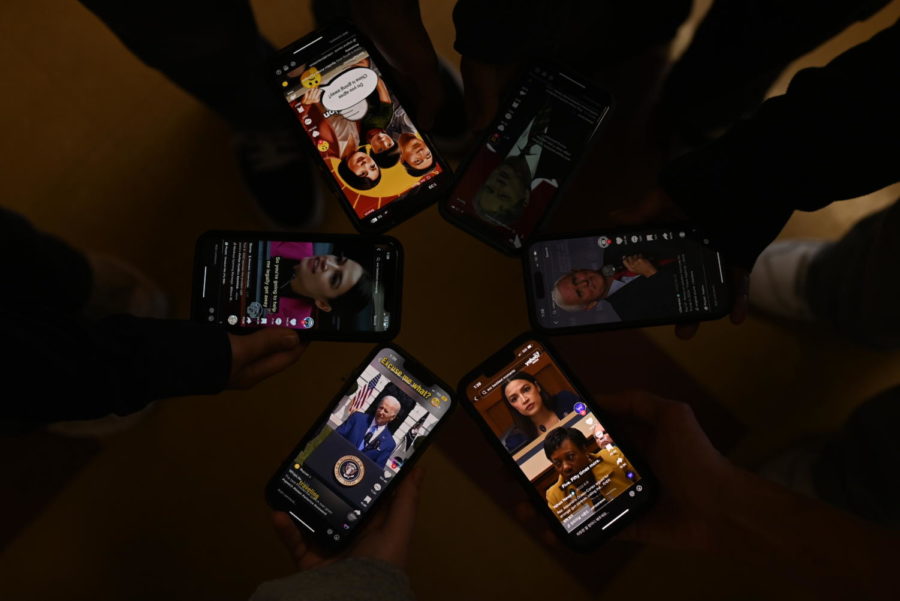The abridged version of this article appeared in the June. 2023 print edition of The Mirror. This is an uncut version.
In December, Congress passed the “No TikTok on Government Devices Act,” requiring the removal of the social media app from federal agencies’ technological devices. The Biden administration made this decision in response to escalating security concerns tied to the Chinese government.
TikTok is a subsidiary of ByteDance Ltd., a Chinese internet technology company, which has come under scrutiny after four of its employees reportedly accessed data from journalists at BuzzFeed News and The Financial Times. This incident led the Federal Communications Commission (FCC) and the Federal Bureau of Investigation (FBI) to warn the U.S. government about ByteDance’s potential access to TikTok users’ information.
Fears have arisen that ByteDance, with its access to TikTok user data, could share private information with the Chinese government. While this has not been proven, Congress has cited it as a primary reason for proposing the bill.
Some, however, question this motive. Senior Gia Rizvi, for example, understands the government’s concerns to some extent but disagrees with the passed bill.
“I personally think it’s mindless,” she said. “I get the original intention for banning TikTok on government devices, but I don’t think it’s helping anyone or our country.”
Efforts were made to extend the ban to all devices in the United States, but explicit information is lacking due to the closed-door operations of the Committee on Foreign Investment in the United States (CFIUS). The topic resurfaced when Congress held a hearing with TikTok’s CEO to discuss concerns about the app posing a national security risk.
During the five-hour hearing, members of the House Energy and Commerce Committee dominated the conversation, while TikTok CEO Shou Zi Chew kept his responses succinct. The entire proceeding was broadcast by the Columbia Broadcasting System (CBS) and posted on YouTube.
Beneath the video, comments from viewers expressed dissatisfaction with Chew’s treatment. This sentiment is prevalent across various social media platforms. Rizvi, too, believes Congress was disrespectful towards the CEO.
“They mispronounced his name often and they especially did not let him speak,” she said. “There were multiple instances where they would ask him an open-ended question and when he tried to explain, they would interrupt by claiming that it’s a yes or no question when it really wasn’t.”
Some observers have characterized the lawmakers’ behavior at the hearing as xenophobic. They argue that other social media apps engage in similar practices, yet Congress appears to single out TikTok due to its presumed ties to China.
“Apps like Instagram and Facebook collect data from users just like TikTok,” Rizvi said. “The difference is that the U.S. government doesn’t like TikTok because they think it’s connected with China, but their association hasn’t even been proven so their treatment towards TikTok and its CEO feels targeted and out of place.”
Given limited opportunities to speak, Chew outlined a plan known as Project Texas, aiming to relocate all U.S. user data to domestic servers. The initiative would also allow U.S. tech firm Oracle to examine the app’s source code and serve as a third-party monitor. Chew suggested that the plan could be implemented by year’s end.
Yet, this proposal did not sway many lawmakers, who remained skeptical. Among them was Republican Rep. Jay Obernolte, who asserted that Project Texas could not provide the assurance the government sought.
As Congress’ stance on TikTok remained unchanged following the hearing, the app continues to be viewed as a potential security concern. While it’s still operational, its future is uncertain due to the possibility of a nationwide ban.
Should that occur, more than 150 million Americans who have embraced the platform would be deeply affected.
“TikTok is my main source of entertainment,” senior Diana Zalmanov said. “It’s a platform that allows people to express their creativity by posting different types of videos so I would hate for it to be shut down.”



